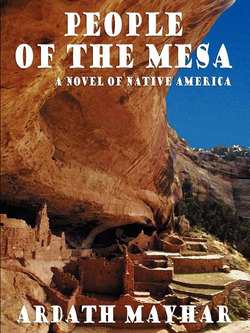Читать книгу People of the Mesa: A Novel of Native America - Ardath Mayhar - Страница 12
На сайте Литреса книга снята с продажи.
ОглавлениеChapter Nine
He did not seek out Ihyannah. He turned his steps away from the house where Ki-shi-o-te lived and veered away from the path to his mother’s doorway. This was a time when not even those who were nearest to him could be of help. He knew he must accept his new responsibilities, now, making them a part of himself.
That could only be done alone, and the time was short. Morning would find him standing on the point of rock where all his predecessors had stood to assume their terrible duties.
Still weak from his long fast, he sought out a spot among the junipers that was sheltered from the sharp breeze that had risen just after he found his mentor. Lying amid the prickly vegetation, he stared up into the cloud-streaked sky.
A magpie alighted on a brittle branch and cocked its head to look down at him. Its immaculate white and black feathers gleamed in the fitful sunlight, and it seemed to be studying him.
Rough juniper bark was grasped in the tough claws—he could feel it plainly. Wind riffled feathers along the back and the edges of the wings. The bird was curious, alert yet intrigued.
Uhtatse felt deeply into the creature, to find that it was trusting him, knowing him to be unlike those of his kind who flung stones or cast short spears from the atlatl to kill any creature that could be boiled for broth. It knew!
Filled with emotion, he opened his eyes and looked up into those berry-bright orbs so near his own. It, too, trusted him to keep the mesa safe. The birds, the deer, the chipmunks and hares, the turkeys and dogs and all the varied creatures knew him. Not only the People depended upon his skills, it seemed.
It was a sobering thought, and he took it with him through that dream-filled day and the overcast night that followed. When he rose with first light and went to his mother’s house, he knew things that he had not learned in any way he knew. He understood matters that no other of his kind, excepting only Ki-shi-o-te and the Healer and the Seer, comprehended.
The mesa was not a thing for mankind alone. It was a circle, and his own kind had a place inside it. But all the creatures, the plants, the stones, even, had their own places there, too. If one disrupted that circle, all would suffer. It was his task to see that the circle was never broken at any of its links, to sense if any danger threatened its integrity.
One who had not purified himself, learning to hear the voices that were too small for normal ears, could not be a powerful One Who Smelled the Wind. He had known that before, but now he understood it completely.
He rose and turned toward his mother’s part of the pueblo. It was time to prepare for his acceptance into his new position.
As his mother combed prickles from his hair with her brush made of fine rootlets, he stood very still. Even when she pulled, he didn’t protest. His sisters were brushing the deer hide robe they had decorated with beads and quills when he was first chosen to be trained for his position. He didn’t object, now, when they turned him around to try it about his shoulders.
He understood them, as well as the magpie and the beasts and rocks and plants. They were glad for him, and he felt their affection like the warmth of small flames licking about his spirit.
When the sun was above the rim on the east, he was ready. His sandals were on his feet, the stiff texture of the decorated yucca fiber tickling his soles. His robe was arranged carefully, his headband tied with great care by his mother’s hands.
He thought, just for an instant, of his uncle, who would have been very pleased, if he had lived until this day. Then the thought slid away as they went out and down the path toward the promontory where he would accept his life’s work from the hands of Ki-shi-o-te.
